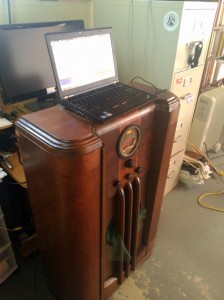 (Source: VOA Radiogram)
(Source: VOA Radiogram)
VOA Radiogram for the weekend of 21-22 September 2013 is produced using Fldigi3.21.76AB. For best results, use this version, available from www.w1hkj.com/alpha/fldigi/v3.21/
One improvement in 3.21.76AB is that it can send images in MFSK64 and MFSK128. Previously, MFSK32 was the fastest MFSK mode for sending images without the pictures appearing skewed (off center). Images do not transmit more quickly in MFSK64 and MFSK128, but they do have higher resolution.
If your decoded MFSK64 and MFSK128 images are still slanted or skewed, calibration of the receive codec might be helpful. One such method for doing this is described here: www.w1hkj.com/FldigiHelp-3.21/DigiWWV.html.
Our non-Latin alphabet of the week is Greek. You will need the UTF-8 character set for the Greek and for some of the punctuation in the English items. I forgot to change some of the typographic apostrophes ’ to typewriter apostrophes ’ , so they will not display correctly if you do not have the UTF-8 character set. In Fldigi, that adjustment is made in Configure > Colors & Fonts.
This weekend’s program includes an English VOA News item in Flmsg format. When all the text is received, the story will render, or pop up, as a new web page on your browser, suitable for saving or forwarding. To make Flmsg work with Fldigi (both can be downloaded from w1hkj.com), in Fldigi: Configure > Misc > NBEMS — Under Reception of flmsg files, check both boxes, and under that indicate where your Flmsg.exe file is located.
Much of the show this weekend is in the MFSK64 mode, which might be a bit optimistic if reception conditions are less than ideal.
Here is the lineup of modes for VOA Radiogram, 21-22 September 2013:
2:53 MFSK16: Program preview
2:40 MFSK32: Sample of Greek text
:49 MFSK32 image: VOA Greek Service logo
3:01 MFSK32: “Need to Protect the Internet”
1:45 MFSK64: Radio Free Sarawak/Discovery Channel
2:23 MFSK64 image: “Duck Commander”
:27 MFSK128: CNBC Saracens deal
:48 MFSK128 image: CNBC logo
:45 MFSK32: E-mail address
4:40 MFSK64: BBC Worldwide, Giglio TV, Voice of Greece, All India Radio
2:55 MFSK64/Flmsg: VOA News re Voyager Golden Record
2:17 MFSK32 image: Voyager Golden Record
:33 MFSK32: Closing announcementsVOA Radiogram transmission schedule
(all days and times UTC)
Sat 1600-1630 17860 kHz
Sun 0230-0300 5745 kHz
Sun 1300-1330 6095 kHz
Sun 1930-2000 15670 kHz
All via the Edward R. Murrow transmitting station in North Carolina.Please send reception reports to [email protected]


